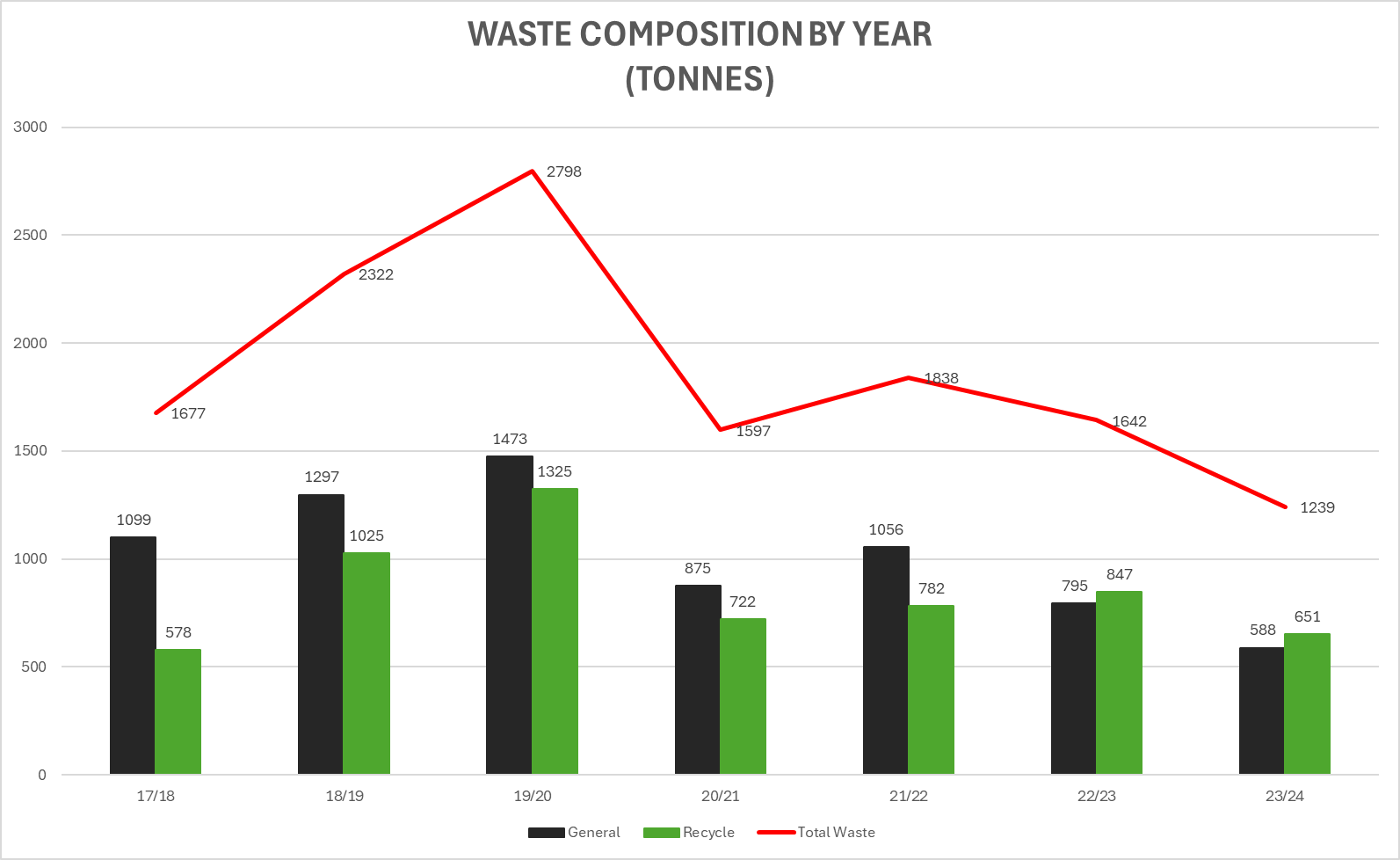At Brunel we constantly review the waste we generate in an effort to continuously improve our recycling capabilities and reduce our negative impact on the environment.
Over the past five years, the University has taken a firm approach to strengthen its waste management processes with the aim to increase its recycling output. As a result, Brunel can boast that 99.9% of its waste it diverted from landfill and 52% of its total waste mass is recycled (as of 2023/24).
To accommodate the University’s ethos of continuous improvement, objectives and targets have been set within Brunel's Waste Management Plan 2022-25 (pdf download) with the aim to achieve a 60% recycling percentage by 2025.
Through its commitment and innovation, Brunel is constantly reducing its total waste volumes and increasing its recycling %, when compared against all other waste streams. The graph below details our waste performance since 2017. The Site Services Department oversees the waste management operations at Brunel and continues to introduce recycling initiatives. Some example initiatives are presented below.
The Site Services Department oversees the waste management operations at Brunel and continues to introduce recycling initiatives. Some example initiatives are presented below.
Waste hierarchy guidance
The Waste (England and Wales) Regulations 2011 introduced the Waste Hierarchy, which is a framework for ranking waste management options according to what is best for the environment. It gives priority to preparing it for re-use, then recycling, then recovery, and last of all disposal.
At Brunel we constantly review our activities and waste management options to ensure we are pushing our waste materials as high up the hierarchy as possible.
Here is further information regarding the waste hierarchy.
Halls waste
Recognising that a majority of the University’s municipal waste is generated in our Halls of Residence and that this is where a majority of the contaminations occur, we have introduced a team of operatives that collect, analyse and segregate each halls kitchen waste. The benefits of this are:
- quality: by identifying contaminations before they are mixed with a larger load, we are able to safeguard a large portion of recycling and therefore recycle more
- financial: allows us to identify contaminated waste streams early, before they reach the waste service provider, enabling us to avoid contamination charges
- engagement: students are able to speak with the Halls Waste Team directly to gain feedback on their recycling and waste segregating performance
Disposable coffee cup recycling points
Disposable coffee cup recycling points have been deployed in academic, administrative and catering areas to encourage people to recycle their cups rather than placing them in the wrong waste stream. The cups captured through this stream are recycled into various products, such as benches and reusable cups, therefore allowing us to contribute towards a Circular Economy.
Mattress, duvet and pillow recycling
Each year hundreds of used mattresses, duvets and pillows require disposal. We send as many duvets and pillows to local dog homes and homeless shelters as we can.
Mattresses are sent to our local Civic amenity site where they are collected for recycling.
British Heart Foundation
Brunel works closely with the British Heart Foundation to both reduce our total waste volume and generate income for good causes. We have positioned multiple banks across campus which enable people to donate their unwanted clothes, and other valuable items, so that they can be sold at local stores to be reused. Anything that isn’t sold on is recycled.
Battery recycling points
Battery recycling points have been introduced across campus which allow anyone who visits the University to deposit their spent batteries, either from work or at home, to divert them from the general waste stream into the WEEE (Waste Electrical and Electronic Equipment) stream where they belong. We send around 40 tonnes of used batteries to be recycled each year.
Food waste collections
Food waste is one of the heaviest forms of waste that can be found in a general waste bin. Extracting this valuable organic waste from the general waste stream reduces the overall weight of the general waste stream, which saves money and allows us to recover the potential of the material through anaerobic/aerobic digestion. Food waste is collected from the following locations on campus:
- staff kitchens
- residential kitchens
- catering outlets
Confidential waste, paper and cardboard
Confidential paper waste is shredded on site by our waste services providers and recycled into tissue products.
Non confidential paper is compacted through our dry mixed recyclables (DMR) waste stream and sent away to be recycled.
Cardboard is collected from various locations across campus, baled and sold for a rebate.
Waste Electrical and Electronic Equipment (WEEE)
All WEEE is separated on site and collected by our waste services partners. PC equipment is refurbished and fed back into the market. Other electrical equipment is recycled to close to 100%.
Vapes
We have recently supported an excellent student project. In the first four months alone of this project over 600 vapes were collected from dedicated vape recycling bins around campus. Any batteries collected from these are recycled through our battery waste stream.
Green Tips
Don’t throw away your unwanted stuff – use Freecycle. You can reduce waste by offering your unwanted items free and it’s also a good opportunity to pick up others’ unwanted items for free. Type 'Hillingdon' or the name of your local town.